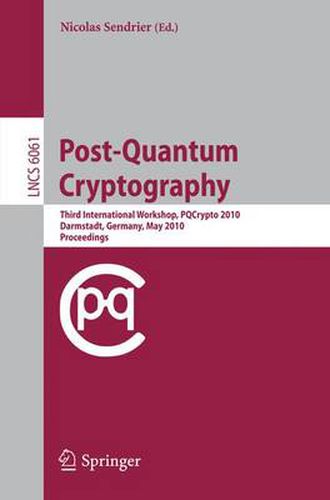Readings Newsletter
Become a Readings Member to make your shopping experience even easier.
Sign in or sign up for free!
You’re not far away from qualifying for FREE standard shipping within Australia
You’ve qualified for FREE standard shipping within Australia
The cart is loading…






The recent development of quantum computing and quantum algorithmics has raised important questions in cryptography. With Shor’s algorithm (Peter W. Shor, Polynomial-TimeAlgorithms for Prime Factorization and Discrete Lo- rithmsonaQuantumComputer ,SIAMJ.Sci.Statist.Comput.41(2):303-332, 1999)thecollapseofsomeofthemostwidelyusedtechniquesfor securingdigital communications has become a possibility. In consequence, the everlasting duty of the cryptographic research community to keep an eye on alternative te- niques has become an urgent necessity. Post-quantum cryptography was born. Its primary concern is the study of public-key cryptosystems that remain - cure in a world with quantum computers. Currently, four families of public-key cryptosystemsseemto havethis potential:code-based,hash-based,lattice-based and multivariate public-key cryptosystems. Other techniques may certainly join this rapidly growing research area. With the PQCrypto conference series, this emerging community has created a place to disseminate results, exchange new ideas and de?ne the state of the art. In May of 2006, the First International Workshop on Post-Quantum Cryptography was held at the Katholieke Univ- siteit Leuvenin Belgium with support fromthe EuropeanNetworkof Excellence ECRYPT.TheSecondInternationalWorkshoponPost-QuantumCryptography, PQCrypto2008,washeldattheUniversityofCincinnati,USA, inOctober2008.
$9.00 standard shipping within Australia
FREE standard shipping within Australia for orders over $100.00
Express & International shipping calculated at checkout
The recent development of quantum computing and quantum algorithmics has raised important questions in cryptography. With Shor’s algorithm (Peter W. Shor, Polynomial-TimeAlgorithms for Prime Factorization and Discrete Lo- rithmsonaQuantumComputer ,SIAMJ.Sci.Statist.Comput.41(2):303-332, 1999)thecollapseofsomeofthemostwidelyusedtechniquesfor securingdigital communications has become a possibility. In consequence, the everlasting duty of the cryptographic research community to keep an eye on alternative te- niques has become an urgent necessity. Post-quantum cryptography was born. Its primary concern is the study of public-key cryptosystems that remain - cure in a world with quantum computers. Currently, four families of public-key cryptosystemsseemto havethis potential:code-based,hash-based,lattice-based and multivariate public-key cryptosystems. Other techniques may certainly join this rapidly growing research area. With the PQCrypto conference series, this emerging community has created a place to disseminate results, exchange new ideas and de?ne the state of the art. In May of 2006, the First International Workshop on Post-Quantum Cryptography was held at the Katholieke Univ- siteit Leuvenin Belgium with support fromthe EuropeanNetworkof Excellence ECRYPT.TheSecondInternationalWorkshoponPost-QuantumCryptography, PQCrypto2008,washeldattheUniversityofCincinnati,USA, inOctober2008.